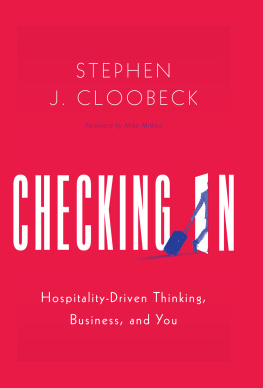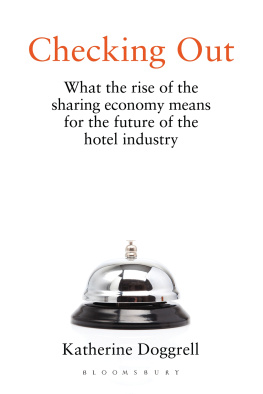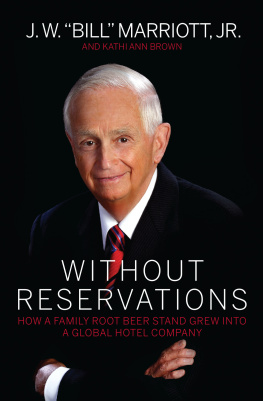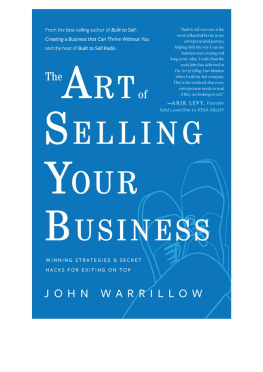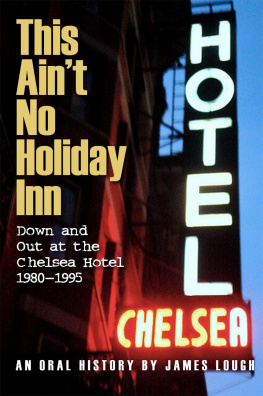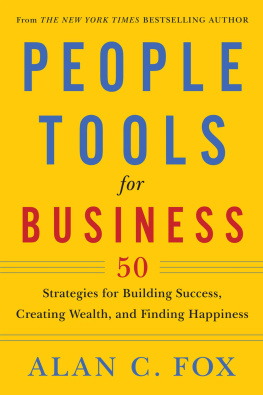Stephen Cloobecks book covers the life of a modern-day business genius. Ive known him for decades, and he has never changed. He is cocky, self-assured, aggressive, arrogant, self-confident, and always focused. Hes not afraid to confront anyone (including me) when he feels its appropriate. But when all the brashness passes, and it does quickly, one sees a person with a social conscience, a person who is known for his generosity. Stephen Cloobeck is a good person, a creator of thousands of jobs, an innovator, and to many, a friend.
Former US Senator Harry Reid
Stephen J. Cloobeck is the best in the business. He told me so himself.
Dr. Frank Luntz, political consultant,
pollster, and communications expert
Stephen Cloobecks story shows that anything is possible when good leaders dont just fight but strategically collaborate for deserving causes. It merits being told, studied, and, hopefully, replicated.
Roger Dow, president and CEO of the U.S. Travel Association
Whether youre a business leader or emerging entrepreneur, theres a lot of wisdom from Stephen Cloobeck about how to be successful.
Robert Shapiro, internationally renowned
litigator and serial business entrepreneur
Ive learned invaluable business lessons from Stephenmost importantly, his unwavering belief in the Meaning of Yes. He created a groundbreaking and innovative 24/7 service culture that always places guests first. People across the globe are changed by these core values every day.
Mike Flaskey, current CEO of Diamond Resorts International

This publication is designed to provide accurate and authoritative information in regard to the subject matter covered. It is sold with the understanding that the publisher and author are not engaged in rendering legal, accounting, or other professional services. If legal advice or other expert assistance is required, the services of a competent professional should be sought.
Published by Greenleaf Book Group Press
Austin, Texas
www.gbgpress.com
Copyright 2018 Stephen J. Cloobeck
All rights reserved.
Thank you for purchasing an authorized edition of this book and for complying with copyright law. No part of this book may be reproduced, stored in a retrieval system, or transmitted by any means, electronic, mechanical, photocopying, recording, or otherwise, without written permission from the copyright holder.
Distributed by Greenleaf Book Group
For ordering information or special discounts for bulk purchases, please contact Greenleaf Book Group at PO Box 91869, Austin, TX 78709, 512.891.6100.
Design and composition by Greenleaf Book Group
Cover design by Greenleaf Book Group
Publishers Cataloging-in-Publication data is available.
Print ISBN: 978-1-62634-552-2
eBook ISBN: 978-1-62634-553-9
Audiobook: 978-1-62634-554-6
Part of the Tree Neutral program, which off sets the number of trees consumed in the production and printing of this book by taking proactive steps, such as planting trees in direct proportion to the number of trees used: www.treeneutral.com

Printed in the United States of America on acid-free paper
18 19 20 21 22 23 10 9 8 7 6 5 4 3 2 1
First Edition
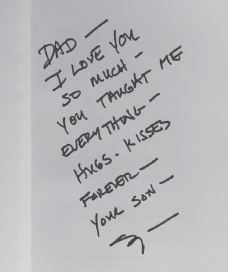
To my father, my best friend and hero. RIP.
CONTENTS
FOREWORD
Yes!
When we interact with service providers, thats the only response we ever want to hear.
Yes, I can take care of that for you. Yes, I understand. Yes, Ill do all I can. Yes, your request is my top priority.
Hospitality, at its core, is about relationships, and every employee at every company has the ability to utter those responses.
But as anyone whos ever checked into a hotel, called a customer service line, or eaten in a restaurant knowsthey often dont. Why?
In the pages that follow, my longtime friend Stephen Cloobeck lays out his vision for how hes helped empower his employees around the world to value the meaning of yes.
This book is a reminder that the simplest lessons can be the most easily overlooked and that a return to fundamentals is often necessary to turn around a struggling business. These lessons apply far beyond the hospitality sector, too. Stephen captures it well when he describes an expensive consultants report written about a flailing company he had just acquired: It was full of numbers, figures, and charts [but] where were the sections on our people, our talent?
I had the great fortune of counting the late Nobel economist Gary Becker among my friends. I first read his seminal work when I was at Berkeley in the mid-1960s. The father of human capital theory, as he was known, shaped my thinking about what really makes a company great. Its not brand, or technology, or product. Its the leadership and the people who work for the company.
As a financier, I focused first on a companys leadership. Whether it was Ted Turner at CNN, or Steve Ross at Time-Warner, or John Malone at Liberty, we sought visionaries who stood for something bigger than making a profit, who were great communicators, and who truly cared for their employees in a way that made their employees care about the company.
Great leaders have the abilityto paraphrase Marcel Proustto see the world through new eyes. They can communicate with and appreciate the experiences of employees, customers, and other stakeholders, and adjust accordingly. They exhibit empathy and apply it to improving the organization.
The idea of a great company is a bit of a misnomer, then. There are great leaders who assemble great teams and instill a drive to accomplish great things together. When that happens, people call the result a great company.
Two examples come to mind.
Akio Morita was only twenty-five years old when he began his nearly five-decade run as the head of Sony. The company produced Japans first transistor radio in 1955, then followed up with a pocket-sized version two years later. The fact that the product didnt actually fit in a pocket was not an issue: Morita provided his sales team with custom shirts with larger pockets. Not a believer in market research, Morita later wrote that our plan is to lead the public with new products rather than ask them what kind of products they want.
When Moritas health failed and he stepped down in 1994, the company was on top of the world with a diversified portfolio that included film studios (Columbia Pictures, Tristar), a record company (Sony Music Entertainment), and a lineup of iconic consumer electronic products, including the Walkman, the Handycam, the Trinitron, and the Discman, to name a few.
By 1997, Sony was a $34 billion company. Thats the year Steve Jobs returned to lead Apple, which was then worth about $1.65 billion. It took twenty-one Apples to make one Sony.
Jobs drove tremendous growth at Apple through the 2000s until his passing in 2011, at which time his company boasted the iconic devices: the iPod, the Mac, the iPhone, and iPad. (Two other interesting parallels between the two men: Jobs billed the iPod as 1,000 songs in your pocket, and he believed people dont know what they want until you show it to them.)
As of the time of this writing, in March 2018, Apple is the most valuable company in the world with a $913 billion market cap, while Sony is at $65 billion. Today, it takes fourteen Sonys to make one Apple. In just over two decades, the two companies experienced a relative change in value of nearly three hundred times.
Next page
